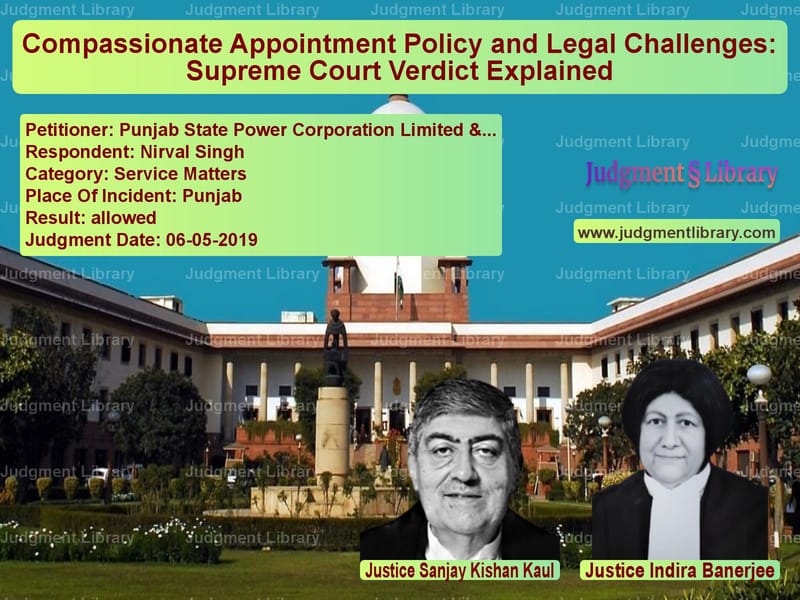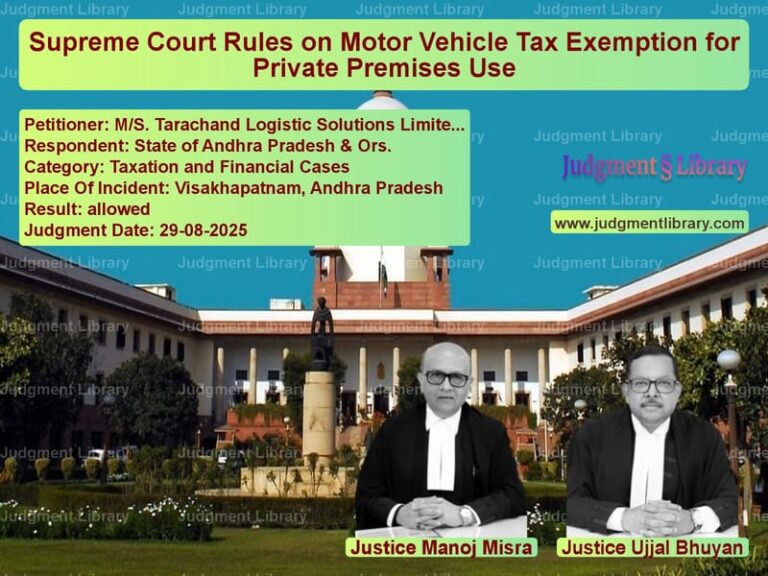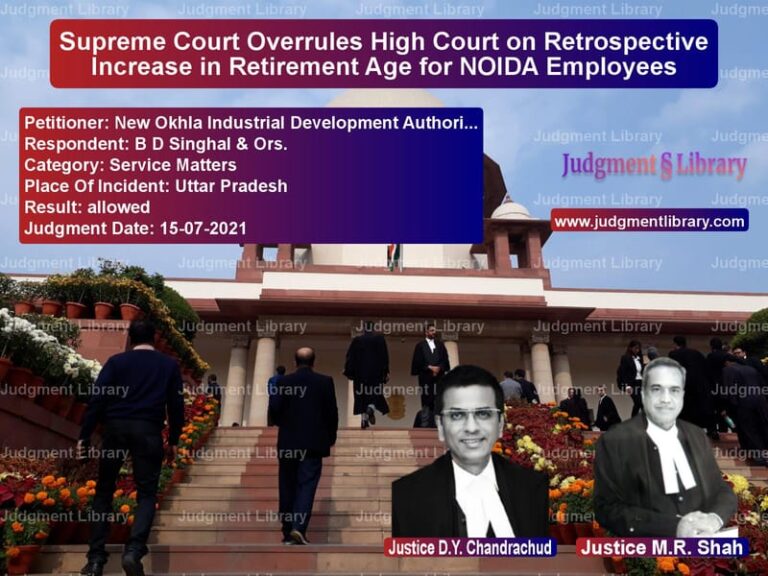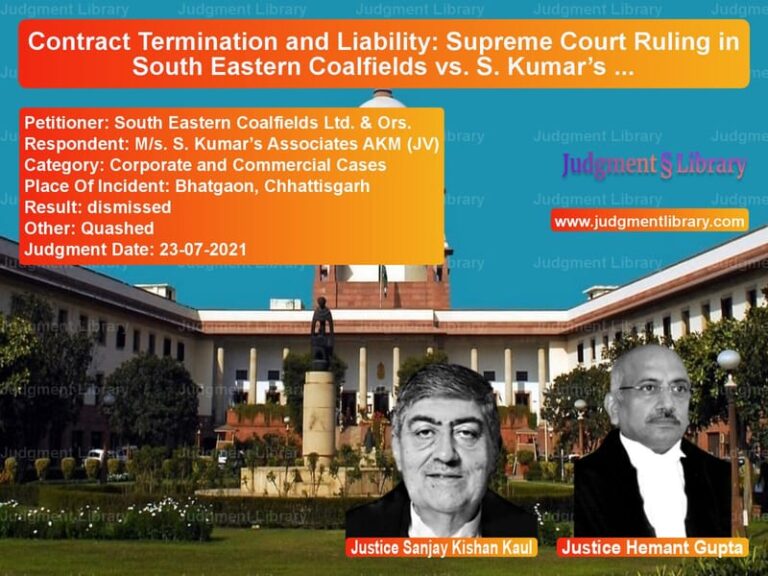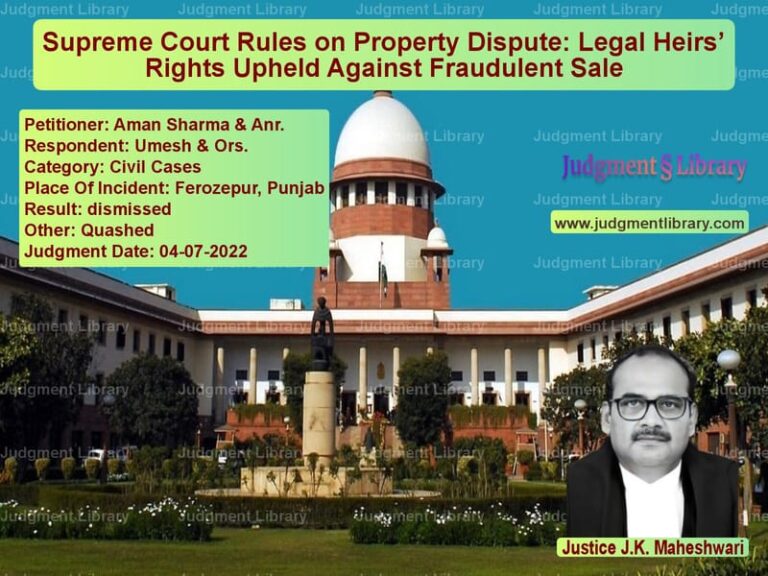Compassionate Appointment Policy and Legal Challenges: Supreme Court Verdict Explained
The case before the Supreme Court involved a legal dispute between Punjab State Power Corporation Limited and Nirval Singh. The core issue revolved around compassionate appointment following the death of an employee in service. The respondent, Nirval Singh, had applied for a compassionate appointment after the demise of his father, who was employed with the appellant company. However, the implementation of the policy was delayed, and a new policy was introduced, offering a solatium instead of a direct appointment.
The Supreme Court examined whether Nirval Singh had a right to demand an appointment under the old policy or whether he was bound by the revised policy that came into effect later. The judgment clarified that compassionate appointment is not a right but a concession granted under specific schemes.
Background of the Case
The respondent’s father, an employee of the Punjab State Power Corporation Limited, passed away on May 17, 2004. Nirval Singh submitted an application for compassionate appointment under the policy effective at that time (dated November 21, 2002). However, due to internal administrative decisions, the implementation of the policy was put on hold, and a revised policy came into effect on November 23, 2004.
Under the new policy, instead of an appointment, the respondent was offered a solatium of Rs. 3 lakhs or the option of a temporary post. He declined both options and continued to seek a regular appointment.
Judicial Proceedings
The respondent first approached a judicial forum in 2011, seven years after his father’s death, by filing a writ petition. The High Court initially directed the authorities to consider his application. However, his request was subsequently rejected.
Following this, Nirval Singh filed another writ petition challenging the rejection, but the court advised him to pursue a civil suit instead. The civil court initially dismissed his suit, but the appellate court allowed his plea, leading to further appeals. Ultimately, the Punjab and Haryana High Court upheld the respondent’s claim, prompting the employer to challenge the decision before the Supreme Court.
Key Legal Arguments
Petitioner’s (Punjab State Power Corporation) Arguments
- The compassionate appointment policy existing at the time of application was later revoked, and a new policy took its place.
- Compassionate appointment is not an inherent right but a concession, subject to policy changes.
- Since the respondent failed to avail himself of the options offered under the revised policy, he could not claim an appointment under the defunct policy.
Respondent’s (Nirval Singh) Arguments
- His application was submitted when the earlier policy was still in force.
- The delay in processing the request was due to administrative decisions beyond his control.
- Refusing his request for appointment violated the principle of legitimate expectations.
Supreme Court’s Observations and Judgment
The Supreme Court emphasized that there is no inherent right to obtain a compassionate appointment. The judgment quoted the ruling in State Bank of India and Another v. Raj Kumar (2010) 11 SCC 661:
“Appointment on compassionate grounds is not a source of recruitment. On the other hand, it is an exception to the general rule that recruitment to public services should be on the basis of merit, by an open invitation providing equal opportunity to all eligible persons to participate in the selection process.”
The Court further elaborated:
“As compassionate appointment is a concession and not a right, the employer may wind up the scheme or modify the scheme at any time depending upon its policies, financial capacity, and availability of posts.”
Key Findings of the Supreme Court
- The delay in approaching the court (7 years) defeated the very purpose of compassionate appointment, which is meant for immediate relief.
- The earlier policy had been abolished and replaced with a new policy, under which the respondent was duly considered.
- The respondent refused both the solatium of Rs. 3 lakhs and a temporary post, thus forfeiting his opportunity under the revised scheme.
- In light of current policy changes, the solatium amount was increased to Rs. 5 lakhs, which the Court directed to be paid within two months.
Final Verdict
The Supreme Court allowed the appeal, ruling in favor of the Punjab State Power Corporation Limited. The Court directed the payment of Rs. 5 lakhs as solatium to the respondent within two months. No costs were imposed on either party.
Implications of the Judgment
This ruling reaffirms that compassionate appointment is not an absolute right but a policy-driven concession. Employers have the discretion to modify or discontinue such schemes based on their financial and administrative capacities. The judgment also underscores the importance of timely legal recourse in employment disputes.
Petitioner Name: Punjab State Power Corporation Limited & Ors..Respondent Name: Nirval Singh.Judgment By: Justice Sanjay Kishan Kaul, Justice Indira Banerjee.Place Of Incident: Punjab.Judgment Date: 06-05-2019.
Don’t miss out on the full details! Download the complete judgment in PDF format below and gain valuable insights instantly!
Download Judgment: Punjab State Power C vs Nirval Singh Supreme Court of India Judgment Dated 06-05-2019.pdf
Direct Downlaod Judgment: Direct downlaod this Judgment
See all petitions in Employment Disputes
See all petitions in Pension and Gratuity
See all petitions in Public Sector Employees
See all petitions in Judgment by Sanjay Kishan Kaul
See all petitions in Judgment by Indira Banerjee
See all petitions in allowed
See all petitions in supreme court of India judgments May 2019
See all petitions in 2019 judgments
See all posts in Service Matters Category
See all allowed petitions in Service Matters Category
See all Dismissed petitions in Service Matters Category
See all partially allowed petitions in Service Matters Category

